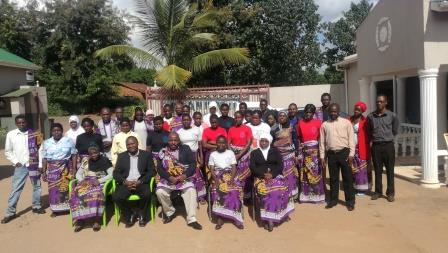
The statistics are staggering. Over 141,000 women and girls induce abortions unsafely in Malawi with about half of them suffering from complications. AKWETE SANDE writes on how rural SRHR women groups are supporting the enactment of the proposed Termination of Pregnancy Bill.
Mention the word abortion and the reactions you get are diverse. For some emotions run high. For others, religious dogma creeps in. And for some, facts do no matter. Usually, truth suffers.
In Malawi, it seen as a taboo of society. A hot potato of safe motherhood. A controversial issue. A neglected public health crisis. A daily occurrence.
Regardless of the divergent views, the reality remains the same. Today over 380 women in Malawi have induced abortions. Oh yes over 380 abortions are induced on daily basis in Malawi.
The talk about abortion is binary in nature.
“For those of us in the city of Blantyre, abortion is not a big deal. You walk into a private clinic at lunch hour. Within 30 minutes the procedure is done and you walk back to work and no one suspects anything,” boasts a young lady based in Blantyre in an interview.
While she has that opportunity, girls and women in rural areas do not have that luxury.
“We lost a woman last week who went to a traditional healer for an abortion. She lost a lot of blood and she died on the way to the hospital,” a 42-year woman revealed recently.
She made the revelation at a meeting Centre for Solutions Journalism convened in Mulanje in southern Malawi.
Disquieting revelation. One nation, two worlds. A nation where urbanites simply walk into private clinics and terminate unwanted pregnancies within 30 minutes and go back to work. And in the same nation, rural women injure themselves or die at traditional healers while inducing abortions.
Can these be isolated cases? Not all.
A research done by Centre for Reproductive Health at the College of Medicine – University of Malawi in collaboration with US-based Guttmacher Institute lifts the lid on this crisis.
“Over 141,000 abortions occur in Malawi—at an annual rate of 38 abortions per 1,000 women of reproductive age—all of which indicates that abortion is common in the country,” reads the study findings in part.
According to the study findings, the majority of abortion procedures are performed under clandestine and unsafe conditions and often resulting in complications.
The link between unsafe abortions and maternal deaths is straight-forward. Many women and girls especially in rural areas die when procuring unsafe abortions. End result: Malawi has one of the highest maternal mortality ratios in the world. This is a nation where there is a one in 29 chance that a teenage girl will eventually die from a pregnancy-related condition.
If you don’t believe it, remember the 17-year old girl in Mangochi who died this year in February as she could not deliver normally.
Ministry of Health admits that unsafe abortion is one of the major causes of maternal death in the country with complications from abortions being responsible for up to 18 percent of maternal deaths.
Paradox
The paradox of it all is that rampant unsafe abortions are happening despite the country having a very restrictive abortion law. Meaning. Malawi’s abortion law is useless. It miserably fails to stop unsafe abortions.
For starters, the country is still stuck with a colonial law formulated in the 1800s which Malawi adopted wholesale in 1964 after independence without changing even a comma, an apostrophe or a clause. Under the Colonial Penal Code of 1930 (Sections 149-151), which Malawi is using to date, the performance of abortions is generally illegal. A person who unlawfully uses any means with intent to procure an abortion is subject to 14 years’ imprisonment.
The law, adopted wholesale by the government of Malawi, states that “a pregnant woman who unlawfully uses any means or permits the use of such means with intent to procure her own abortion is subject to seven years’ imprisonment.
“A person who unlawfully supplies or procures any thing whatever, knowing that it is intended to be unlawfully used to procure an abortion, is subject to three years’ imprisonment.”
Nonetheless, abortions can be legally performed in Malawi to save the life of the pregnant woman. Section 243 of the Penal Code provides that a person is not criminally responsible for performing in good faith and with reasonable care and skill a surgical operation upon an unborn child for the preservation of the mother’s life if the performance of the operation is reasonable.”
A local renowned gynaecologist Dr Chisali Mhango once branded Malawi’s abortion law as toothless and irrelevant.
“Restrictive abortion laws do not stop abortion from occurring, they just drive it underground, forcing women to resort to clandestine procedures, which are often unsafe,” said Dr. Chisale Mhango, senior lecturer at the College of Medicine.
He added: “This outdated law has failed to address the problem of unsafe and unsafe abortion which at the moment is an urgent public health priority.”
New proposed law
Despite the legal restrictions in place on abortion in Malawi, the practice still occurs and is usually performed by untrained personnel or induced by pregnant women themselves.
With research estimates showing rampant unsafe abortions, in February 2015 the Law Commission recommended liberalisation of the law on the evidence of the negative health impact of unsafe abortions, the high cost of providing post-abortion care, and citing Malawi’s obligation to provide safe abortion provision as a signatory of the Maputo Protocol and other conventions.
In the proposed law, girls and women in Malawi will be allowed to terminate their pregnancies at the hospitals with support from certified health service provider where he or she is of the opinion, in good faith, that—
(a) the continued pregnancy will endanger the life of a pregnant woman;
(b) the termination of pregnancy is necessary to prevent injury to the physical or mental health of a pregnant woman;
(c) there is severe malformation of the foetus which will affect its viability or compatibility with life; or
(d) the pregnancy is a result of rape, incest or defilement: Provided that the incident of rape, incest or defilement has been reported to Police, and that the pregnancy has not exceeded sixteen (16) weeks from the date of conception.
The proposed law outlaws seeking abortion services in hospitals due to socio-economic circumstances of the pregnant woman.
It also emphasises, “termination of pregnancy shall not be performed on demand or for any other reason.”
Huge support

While some urbanites who clandestinely get abortion services at private clinics are on the forefront of opposing abortion law reform, rural-based SRHR (Uchembele Wa Bwino) groups are in full support of the proposed reforms.
“For those of us who have buried our relations who have died due to unsafe abortions, we would be extremely happy if the proposed law is passed,” said one woman during the Mulanje meeting.
Group Village Headwoman Tambala of Mulanje added: “We appeal to our government to ensure that this law is passed. Issues of sexual and reproductive health and rights are personal and private. Those who do not want to access abortion services due to their religious or cultural beliefs should be respected and those who are desperate to access such services should not be denied the opportunity. But no single group should force their views on others.”
Making a presentation during the training of SRHR women groups from Mulanje, Ligomeka said it was a pity that the issue of abortion was a class issue.
He said: “The rich, the urbanites, the educated, the middle and the upper class know where to get safe abortion procedures and pretend to be holy during public debates. It is the poor, the villagers, the lower class, the bare-feet women and girls here in Malawi who are bearing the heavy burden of unsafe abortions.
Ligomeka added: “No wonder when we call for abortion law reform, the hypocrites are on the forefront to oppose abortion law reform claiming we are a God-fearing nation. Why do we mock God with our hypocrisy? Should a nation where corruption is rampant, rape and defilement are soaring only cite the moniker of God-fearing nation when it comes to abortion law reform?”
According to Ligomeka, male chauvinism and outmoded patriarchal system which deliberately uses culture and religion to oppress women is responsible for the slow progress in the enactment of the proposed Termination of Pregnancy Bill.
He praised SRHR women groups in rural areas for supporting abortion law reform.
Ligomeka said Centre for Solutions Journalism (CSJ) believes that access to comprehensive sexual and reproductive health programmes is important in addressing maternal mortality and morbidity, fighting HIV and AIDS, and meeting the sexual and reproductive health needs of women and men while at the same time promoting human rights.
With funding from Safe Abortion Action Fund, CSJ, a human rights media organization is training rural-based SRHR groups on the proposed Termination of Pregnancy Bill in three southern Malawi districts of Mulanje, Chiradzulu and Zomba.
